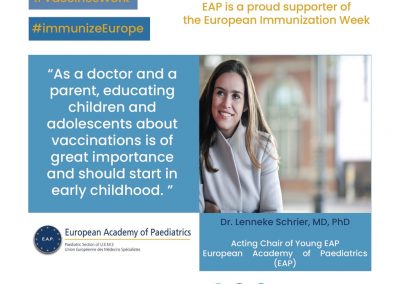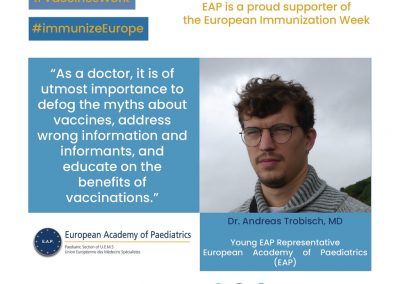YEAP WEBINARS
Webinars
Patient Involvement webinar

Innovations in Post-Graduate Training: Entrustable Professional Activities
Entrustable professional activities (EPAs) are a popular topic within competency-based medical post- and undergraduate education programs in many countries. The wish to bridge the gap between well-elaborated competency frameworks and clinical practice in patient care has led to the creation of this concept. In teaching settings, supervisors decide when and for what tasks they entrust trainees to assume clinical responsibilities. Building on this concept, EPAs are units of professional practice, defined as tasks or responsibilities to be entrusted to the unsupervised execution by a trainee once he or she has attained sufficient specific competence. As such, EPAs are a means to translate competencies into clinical practice. EPAs are independently executable, observable, and measurable in their process and outcome, and therefore, suitable for entrustment decisions. In this webinar, Professor Olle ten Cate, Professor of Medical Education at the University Medical Center, Utrecht (NL), and Professor Reinoud Gemke, Professor of Pediatrics and Child Health at the VUmc University Medical Center, Amsterdam (NL) and (former) Chair of the Dutch Taskforce Optimization Postgraduate Paediatrics (TOP2020), illustrate how EPAs can be applied to ensure supervisors have confidence in their trainees to perform professional duties unsupervised and how this concept has been implemented as an assessment tool in post-graduate paediatric training programs in The Netherlands, the USA and Canada. This is the first webinar in our new Young EAP/EAP Educational Series.
Contact: L. Schrier
Want to learn more?
Publications:
EPAs for Pediatrics: https://insights.ovid.com/pubmed?pmid=21169788
EPAs for General Pediatrics (American Board of Pediatrics): https://www.abp.org/entrustable-professional-activities-epas
EPAs for Pediatric Subspecialties (American Board of Pediatrics): https://www.abp.org/subspecialty-epas
EPAs for Developmental-Behavorial Pediatrics: https://onlinelibrary.wiley.com/doi/full/10.1111/jpc.12238
EPAs for Pediatric Gastro-Enterology (NASPGHAN): https://www.naspghan.org/content/132/en/training/opportunities/Entrustable-Professional-Activities
Video material (including English subtitles):
The experience of a pediatric resident with EPAs: https://www.medischevervolgopleidingen.nl/ondersteuningsmateriaal/movie-summative-entrustment-decision-making-residents-experiences
The experience of a pediatric resident with EPAs: https://www.youtube.com/watch?v=3njA5vD8NbI&feature=youtu.be
Experience with EPAs in Pediatrics: https://www.youtube.com/watch?v=R_tPfMVYqtc
Adding value to paediatric care
Paediatric practice is dynamic and continually changes with evidence and experience. Keeping up with contemporary best practice can be challenging. Out-of-date practices can lead to patients getting inappropriate, unnecessary or even potentially harmful interventions. The identification and reduction of low-value medical practices has the potential to drive safer, high-quality patient care and guide appropriate decisions in resource-limited situations. Dr. Sarah Dalton is paediatrician (Emergency Medicine) and president of the Paediatrics & Child Health Division of the Royal Australasian College of Physicians. In thiswebinar, she guided us through the development of means to decrease low-value care in paediatrics and shared her experience on how to involve clinicians in systems change. Prof. Laurents Stassen, surgeon, and Corry den Rooyen, educator, are director and project leader of the Dutch “Awareness Project”, a national program that aims to train residents to be good stewards of limited health care resources. This program includes training of various techniques related to medical decision-making and quality improvements aimed at delivering high value to patients. In this webinar, they shared their experience in this field. If you want to learn more about what Young EAP is doing in this field, please contact Andreas Trobisch.
YoungEAP Webinar – Adding value to paediatric care from YoungEAP on Vimeo.
Is it time for a new concept of health?
The current WHO definition of health is no longer fit for purpose given the changes in disease patterns and technological advances. In this webinar, Dr. Machteld Huber discusses the development of a new concept of health and practical tool for children. Dr. Machteld Huber, former general practitioner, is researcher and founder of the Institute for Positive Health (iPH) in the Netherlands. The new international health concept called “Positive Health” is dynamic, patient-centered and based on resilience and self-management. This new concept is not only embraced by health care professionals, but also by Dutch municipalities and schools. In collaboration with children, dr. Huber also developed a Kids Tool, which is currently used by paediatricians and general practitioners. The new concept and tools are currently being implemented in various other countries, including Iceland, Belgium and Japan.


